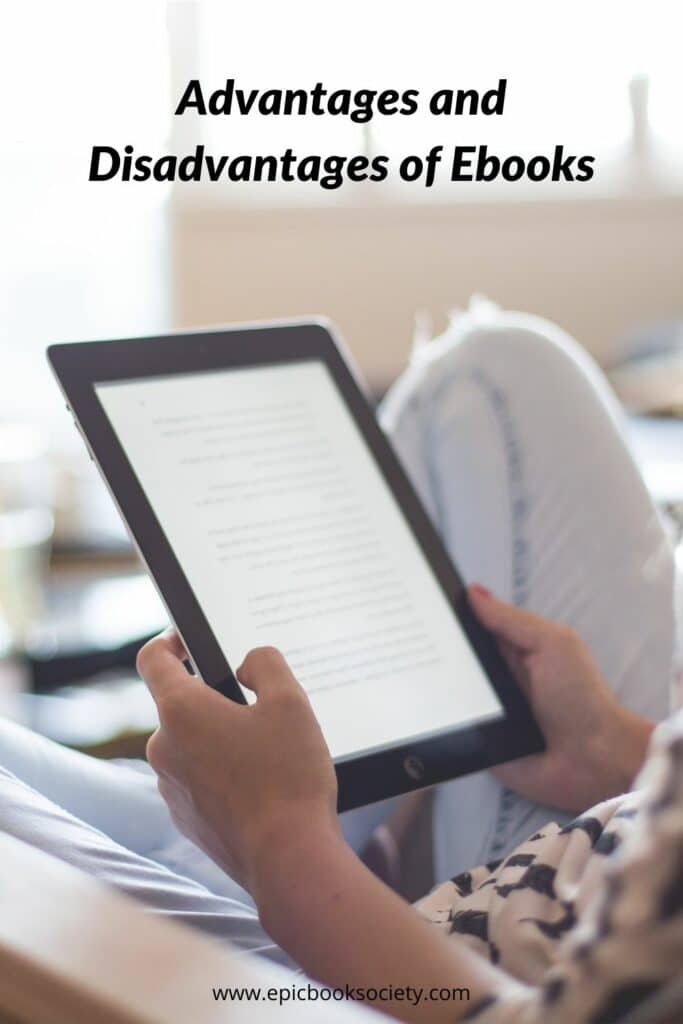Last Updated on August 18, 2023 by Louisa
Whenever I buy a new book, I often debate with myself between paperback books and ebooks.
Electronic books, or ebooks as they are popularly known, have become increasingly popular in recent years, especially now digital technology makes everything so accessible.
But what are the advantages and disadvantages of ebooks? Is it ok for us to wave goodbye to paperback books and embrace the ebook for good?
In this guide, I’ve listed all the pros and cons of ebooks and why you might consider ebooks vs paperback books.
Advantages of Ebooks
Let’s begin with the positives. Below are some of the main advantages to ebooks.
1. Portability
One of the most significant advantages of ebooks is their portability. With an ebook, you can carry an entire library with you wherever you go.
This means that you can read your favorite books on your commute, during your lunch break, or while traveling without having to carry heavy physical books.
This is especially useful when you travel, as you are limited in the number of items you can pack.
Ebooks mean you don’t weigh your bags and luggage down with heavy books.
2. Saves Space
This brings me to another advantage of ebooks, and that is they take up very little space.
Since they are stored digitally, you don’t need a physical bookshelf to store them.
This makes it easy to keep your books organized and tidy without taking up too much space in your home.
3. Cost
Reading is an expensive hobby, if you only buy paperbacks.
Ebooks are often cheaper than physical books. This is because publishers don’t have to pay for printing, shipping, and storage costs.
As a result, they can offer their books at a lower price point.
Additionally, there are many free ebooks available online that you can download and read for free, especially if you use a subscription service such as Kindle Unlimited.
4. Accessibility
Ebooks are accessible to anyone with an internet connection and a device to read them on.
This means that people who live in remote areas or who have limited access to physical libraries and book stores can still access a wide range of books.
5. Customization
With ebooks, you have the ability to customize your reading experience. You can adjust the font size, background color, and even the formatting to suit your preferences.
This can make reading more comfortable and enjoyable for those who struggle with traditional printed books.
If you are short-sighted or you have poor eyesight, then this customization factor is a lifesaver.
It not only allows you to make a larger font size, but you can also use the “dark mode” feature which allows you to read in bright lighting without the pages reflecting the light.
Disadvantages of Ebooks
And of course, with every perk, there is a downside. Here are the downsides to ebooks.
1. Potential Eye Strain
Reading ebooks on electronic devices can sometimes strain your eyes, especially if you are reading for long periods of time.
If you read at night or in dim lighting, it can cause eye strain.
Likewise, if you are reading an ebook on a phone or iPad, the light emitted by screens can cause eye fatigue and strain.
2. Battery Life
Ebooks require power to be read, which means that you need to keep your device charged.
If you forget to charge your device, you won’t be able to read your book until it’s fully charged again, which can be a pain.
3. Device Compatibility
Ebooks are not compatible with all devices. Some ebooks are only available on specific devices such as Kindles, which can limit your options.
There is also the rare occasion that your device needs an update and is no longer compatible with some of the older ebooks in your digital catalogue.
4. Ownership
When you buy an ebook, you don’t actually own the book itself.
Instead, you are purchasing a license to read the book on your device.
This means that you may not be able to lend the book to a friend or family member, and you may not be able to sell the book if you decide you no longer want it.
If you lose your device and need a new one, it can sometimes mean you lose your ebooks if you don’t have them with a subscription service.
5. Distractions
Reading ebooks on electronic devices can be distracting. Notifications from social media, emails, and other apps can interrupt your reading experience and make it difficult to stay focused.
If you have a Kindle or other reading device, you can get around this.
6. Expensive upfront cost
While ebooks are cheaper, you do need to pay a larger upfront cost. Most e-readers such as Kindles are quite pricey, especially if you get them brand new.
You save money in the long run, but it’s something to consider.
The Verdict
Ebooks have several advantages and disadvantages, as you can see in this guide.
Ultimately, whether ebooks are the right choice for you will depend on your personal preferences and needs.
If you value portability and customization, then ebooks may be a good option for you.
If you prefer the tactile experience of physical books and want more control over your ownership of them, or you want to build a physical collection, then traditional paperback books might be a better choice.
Do you prefer ebooks or paperback books? Let me know in the comments.


